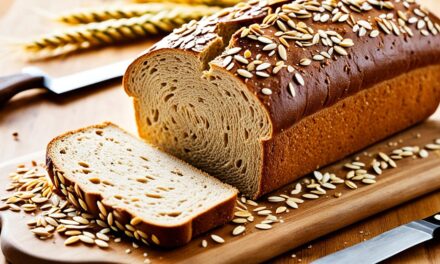Did you know that the average person has about 9 food cravings per week?
Food cravings can be a powerful force, making it difficult to resist the temptation of that slice of chocolate cake or bag of salty chips. But fear not! Science has provided us with strategies that can help you outsmart your cravings and develop healthier eating habits.
In this article, we will explore the science behind food cravings, the factors that influence them, and most importantly, science-based strategies that can help you regain control. So, buckle up and get ready to conquer those cravings!
Key Takeaways:
- Food cravings are a common occurrence, with the average person experiencing about 9 cravings per week.
- Understanding the science behind food cravings can help you develop strategies to manage and overcome them.
- Factors such as natural physiology, exposure to food cues, and emotional triggers can influence food cravings.
- By employing techniques such as mindful eating, distraction techniques, and making healthier food choices, you can outsmart your food cravings and develop healthier habits.
- Remember, managing cravings is a journey that takes time and effort, but with science-based strategies, you can achieve lasting appetite control.
The Science of Food Cravings
Food cravings are like craving for a much-needed break after a long day. They are irresistibly powerful desires that demand satisfaction. You know the feeling – when you can practically taste that decadent chocolate cake or hear the satisfying crunch of crispy French fries. But have you ever wondered what causes these intense cravings?
Well, it turns out that food cravings have both physiological and psychological causes. Physiologically, our brain’s reward system plays a significant role. When we think about or see certain foods, our brain releases neurotransmitters that activate the reward system, making us crave those specific foods. It’s like our brain saying, “Hey, that chocolate cake will make you feel good! Go get it!”
Emotionally, cravings can be triggered by sights and smells that evoke memories and emotions associated with the enjoyment of certain foods. That mouth-watering smell of freshly baked cookies can transport us back to our childhood, reminding us of the comfort and joy that comes from indulging in our favorite treats.
Interestingly, there may be a link between food cravings and body weight. Research suggests that people who experience intense cravings often have higher body-mass indexes and are more prone to overeating and weight gain. This connection reinforces the importance of understanding and managing our cravings to maintain a healthy energy balance.
“Cravings are like whispers from your body telling you what it needs. Listen carefully, and you’ll find the right balance between indulgence and nourishment.”
To effectively manage and overcome food cravings, it’s essential to understand the underlying causes and develop strategies that work for you. By becoming more aware of the triggers that set off your cravings, you can take steps to outsmart them. Mindfulness techniques, such as paying attention to the flavor and texture of your food, can help you slow down and recognize true hunger versus cravings. Distraction techniques, like engaging in a hobby or going for a walk, can redirect your focus away from the tempting thoughts.
Healthy food choices play a significant role in managing cravings as well. By opting for nutrient-dense, satisfying foods, you can curb cravings while nourishing your body. Regular exercise has also been shown to reduce cravings and support overall well-being.
So, the next time you find yourself at the mercy of a craving, remember that understanding the science behind it can empower you. By acknowledging the physiological and psychological causes, you can develop effective strategies to manage and overcome food cravings, achieving a healthier balance in your relationship with food.
Factors That Influence Food Cravings
Food cravings can be influenced by a variety of factors. Understanding these factors can empower you to make informed choices and take control of your cravings. Let’s explore some of the key influencers:
Food Cues
Food cues, such as enticing advertisements and tantalizing smells, can activate our brain’s reward system, triggering intense cravings. These cues prompt us to seek out the foods associated with pleasure and satisfaction. Food cues have a powerful influence on our cravings and make it challenging to resist certain foods.
The Food Environment
The food environment we navigate plays a significant role in our cravings. We are surrounded by a variety of energy-dense foods that are easily accessible and highly appealing. These hyper-palatable options make it tempting to give in to our cravings, especially in environments where unhealthy choices abound. Your food environment can shape your cravings and dietary choices.
Stress and Emotions
Stress and emotions can trigger cravings as a means of seeking relief and comfort. When faced with stressful situations or challenging emotions, many individuals turn to highly craved foods for solace. The emotional connection to these foods can create a strong desire to consume them. Stress relief and emotional comfort are deeply intertwined with our cravings.
The Deficiency Hypothesis
The deficiency hypothesis proposes that cravings may be influenced by our body’s need for specific nutrients. For example, if your body lacks certain vitamins or minerals, you may experience cravings for foods that contain those nutrients. However, it’s worth noting that this hypothesis is still debated among researchers. Nutritional deficiencies could potentially drive your cravings.
The Conditioning Hypothesis
The conditioning hypothesis suggests that cravings are influenced by learned associations and emotions connected to specific foods. Over time, we develop habits and strong emotional ties to certain foods, which can drive our cravings. The conditioning hypothesis highlights the role of learned behaviors and emotional responses in our cravings. Your past experiences and associations with food can greatly impact the intensity of your cravings.
| Factors | Influence on Food Cravings |
|---|---|
| Food Cues | Activate the brain’s reward system, prompting cravings for specific foods. |
| The Food Environment | Surround us with convenient, hyper-palatable options that heighten our cravings. |
| Stress and Emotions | Trigger cravings as a coping mechanism for stress relief and emotional comfort. |
| The Deficiency Hypothesis | Suggests cravings may be influenced by physical needs for specific nutrients. |
| The Conditioning Hypothesis | Proposes that cravings are driven by habits and emotions associated with certain foods. |
Understanding the factors that influence your food cravings can help you develop effective strategies to manage and overcome them. By recognizing the impact of food cues, the food environment, stress, and emotional triggers, as well as considering the deficiency and conditioning hypotheses, you can make conscious choices and regain control over your cravings.
Strategies to Manage Food Cravings
Cravings can sometimes feel overpowering, but fear not! There are science-based strategies that can help you conquer those pesky monster cravings. Take a deep breath and get ready to outsmart your cravings with these tips:
Mindful Eating
When it comes to mindful eating, it’s all about taking the time to savor every bite. Slow down and pay attention to the flavor, texture, and satisfaction of your food. By truly tuning in to your body’s cues, you can better recognize when you’re truly hungry or satisfied, helping you make more mindful food choices. So put down that phone, turn off the TV, and take a moment to enjoy your meal without distractions.
Distraction Techniques
When a craving hits, one of the best ways to overcome it is by redirecting your focus. Engage in activities that occupy your mind and keep you away from the tempting treats. Whether it’s going for a walk, calling a friend, or diving into a hobby you love, find something that distracts you from the craving and gives you a sense of fulfillment.
Healthy Food Choices
Stocking up on nutritious snacks is crucial for combatting cravings. Having a variety of healthy food options readily available can help prevent giving in to the allure of unhealthy treats. Instead of reaching for that bag of chips, grab a handful of crunchy carrots or indulge in a juicy piece of fruit. By nourishing your body with wholesome foods, you’ll satisfy your taste buds and keep cravings at bay.
Regular Exercise
Exercise not only boosts your mood and overall well-being, but it can also help curb cravings. Physical activity releases endorphins, which have a positive effect on your brain and can help reduce cravings. So lace up those sneakers, hit the gym, or try out a new workout class. Your body will thank you, and your cravings will have to take a backseat to your newfound energy and determination.
Journaling
Keeping a food journal can be a powerful tool for understanding your cravings. By jotting down what you eat and how you feel, you can start to identify patterns and triggers associated with your cravings. Are stress or certain emotions causing those late-night snack attacks? Are there particular situations that consistently lead to a craving? Journaling allows you to gain insight into your eating habits and empowers you to make mindful choices going forward.
By incorporating these science-backed strategies into your daily routine, you’ll be well on your way to mastering your cravings and developing a healthier relationship with food.
Remember, overcoming cravings is a journey, and it’s important to be patient and kind to yourself along the way. With determination, practice, and the right strategies, you can conquer those cravings and nourish your body with the healthy choices it deserves.
Conclusion
Food cravings can be a real challenge, but fear not! With a little knowledge and some science-based strategies, you can outsmart those pesky cravings and take control of your appetite. It’s all about understanding the triggers and implementing healthy habits to keep cravings at bay.
First and foremost, practicing mindful eating is key. Take the time to savor each bite, paying attention to the flavors and textures of your food. This not only helps you connect with your body’s hunger and fullness cues, but also allows you to truly enjoy and appreciate the food you eat.
Another tactic to combat cravings is by employing distraction techniques. When a craving hits, try engaging in an enjoyable activity or call up a friend for a chat. By redirecting your focus, you can steer clear of giving in to those tempting treats.
Lastly, making healthier food choices is crucial for long-term success. Stock your pantry and fridge with nutritious options that are easily accessible. When you fill your plate with nourishing foods, you not only satisfy hunger, but also fuel your body with the nutrients it needs.
Remember, managing food cravings is a journey. It takes practice and perseverance to develop healthy eating habits and gain control over your appetite. Be kind to yourself along the way and approach cravings with compassion. With the right strategies and a proactive mindset, you can triumph over food cravings and achieve lasting appetite control.
FAQ
What are food cravings?
What causes food cravings?
What factors influence food cravings?
How can I manage food cravings?
Can I outsmart my food cravings?
MORE SOURCES TO READ:
- https://www.webmd.com/diet/ss/slideshow-stop-cravings
- https://www.everand.com/book/377642688/Food-Cravings-Simple-Strategies-to-Help-Deal-with-Craving-for-Sugar-Junk-Food-Eating-Disorders
- https://biobabehealth.com.au/2022/03/25/why-do-i-have-food-cravings-10-honest-and-totally-doable-science-backed-strategies-to-finally-outsmart-your-food-cravings-part-1/
![]()














Recent Comments